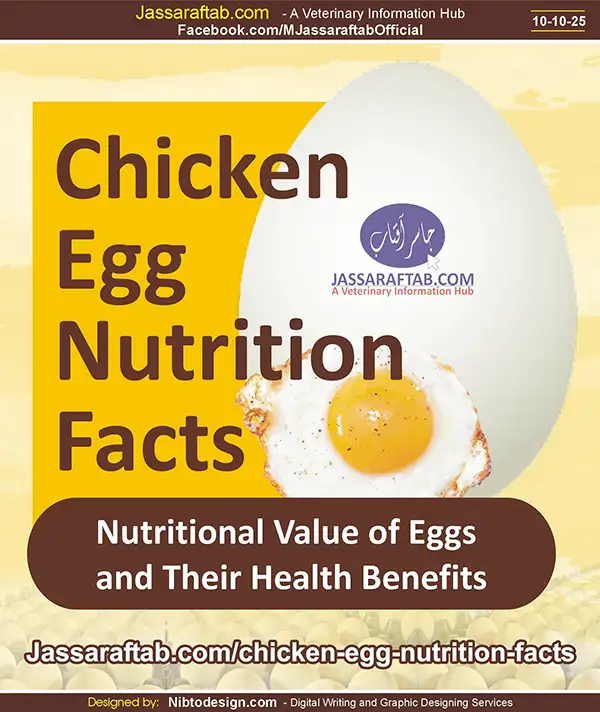
Chicken Egg Nutrition Facts – Nutritional Value of Eggs and Their Health Benefits
The nutritional value of egg makes is one of the most remarkable foods for humans. It is a small and simple food that is rich in nutrition. Due to its nutritional composition, it is also called a natural multivitamin. Moreover, it is an economical source of protein and nutrition for all ages. Nutritional Value of Eggs, different chicken egg nutrition facts, benefits of eggs, its role in different body functions, benefits for different age groups, effects of cooking on chicken egg nutrition, myths and misconceptions about eggs and other aspects of the nutritional importance of eggs are discussed here.
Nutritional Value of Eggs
A chicken egg contains about 70 to 78 calories. It contains balanced nutrients for health. It provides around 6 grams protein and 5 grams fat.
Egg is also a source of vitamins and it is called natural multivitamian. Egg is rich in fat soluble vitamins like A, D, E, and K. It also contains vitamin B2 (riboflavin), B6, B9 (folate), and B12.
Moreover, egg also provides minerals, including iron, phosphorus, zinc, and selenium. Furthermore, it is also a source choline. Choline is a highly important nutrient for brain function and health. Antioxidants lutein and zeaxanthin are benificial of eye healht.
Nutritional value of eggs makes it a super food that contains all nutrients required by the human body. It is also an excellent source of highly digestible protein, which is efficiently used by the body. It is a source of muscle building amino acids for growing children, youngsters, athletes, and patients. The nutritional value of eggs makes them beneficial for all ages.
Chicken egg nutrition assists in enhancing your immune system, reducing inflammation and can prevent chronic diseases.
Chicken Egg Nutrition Facts about Cholesterol and Heart Health
Eggs is criticised for 185mg of cholesterol as its nutritional part. It is associated with raising of blood levels of cholesterol and heart disease. But it is not the fact. Scientific research has revealed that dietary cholesterol does not have much of an impact on blood cholesterol in healthy people.
The body naturally balances cholesterol production, and eating eggs can even raise “good” HDL cholesterol. A moderate level of egg intake balances the cholesterol level in a better way. It increases the HDL (the good type of cholesterol) and transforms LDL (the bad type of cholesterol) into a larger and less harmful particle. Currently, the American Heart Association supports the regular intake of eggs as part of a balanced meal. Howeover, the real concern for heart health lies in saturated fat intake and lifestyle choices, not in eating eggs.
Egg Nutrition Facts and Brain, Eyes, Skin, and Body Strength
The benefits of eggs to the brain, eyes, skin, nails and hair are also brought out in the Nutritional value of eggs. Egg is regarded as very good for brain health due to the presence of choline. Acetylcholine is formed with the help of choline. It is a neurotransmitter that assists in memory and learning.
The presence of choline is also useful to pregnant and breastfeeding mothers, as it helps in the development of the fetus brain and spinal cord.
Eggs also save the vision of the eyes as they contain antioxidants lutein and zeaxanthin. These antioxidants decrease cataract and macular degeneration.
Eggs are sources of vitamin D, phosphorus, and easily digestible protein. It keeps bones strong and aids in repair of the body tissues. Regular consumptions of eggs enhance skin, hair and nail development also due to presence of biotin and selenium. Due to good cholesterol and balanced nutrients, eggs also help in weight control.
Chicken Egg Nutrition Facts and Different Ages
Eggs are a wholesome, inexpensive, and nutritious meal that can be consumed by children and adults. Their protein, vitamins, and minerals are of great quality, making it a useful component of a balanced diet at all ages. We shall see here the benefits of eggs on individuals at various ages in life.
Egg Nutrition Facts for Infants and Toddlers (6 months to 5 years)
Early exposure to eggs gives an early childhood a platform of rapid growth and good development. Eggs are very good sources of high quality protein and key fatty acids that contribute to the development of tissues and the growth of muscles. The choline and DHA found in the eggs help in the development of the brain, visual function, and memory. Frequent intake of eggs also enhances the activity of the immune system and prevents cases of nutritional deficiencies such as iron deficiency and vitamin D deficiency.
Chicken Egg Nutrition Facts for School-Age Children and Teenagers
School going children and teenagers require high-energy foods that are rich in nutrients. Proteins, calcium and vitamin D in eggs provide sustained energy and help the muscles and bones develop. B-vitamins in eggs boost metabolism and ensure that one remains focused when at school and in sports. In addition, eggs are a perfect breakfast food as far as cognitive performance and memory is concerned because of choline.
Chicken Egg Nutrition Facts and Benefits for Adults
Eggs helps to maintain the muscles and long term energy. Eggs have a good quality protein that is useful in repairing the body tissues and maintaining the lean muscle mass. Healthy fats ensure stable energy throughout the day. Eggs are also beneficial to control body weight. Lutein, zeaxanthin, and antioxidants help to protect the eyes and decrease the chances of age related macular degeneration.
Chicken Egg Nutrition Facts and Benefits for Pregnant and Women with Baby
Eggs are important in satisfying higher nutritional needs during pregnancy and breastfeeding period. They contain a lot of choline, which is essential to the development of the fetal brain and neural tube. Eggs contain folate and iron that prevent anemia and aid the development of the baby. Also, the protein and essential fatty acids in eggs facilitate healthy tissue growth of the mother and the child. In the case of breastfeeding mothers, eggs also improve the quality of milk by adding in it the required nutrients.
Chicken Egg Nutrition Facts and Benefits for old age
Aging makes people be concerned about muscle deterioration, bone weakness, and deteriorating cognitive abilities. Eggs are a good food option against such effects. Their protein helps to prevent wasting of muscles (sarcopenia) and gives flexibility, and vitamin D and phosphorus make bones stronger. Lutein and zeaxanthin are beneficial to the eye, whereas choline is beneficial to memory and the brain. Hard-boiled eggs or scrambled egg is also a source of quality nutrition that is easy to digest among the elderly.
Chicken Eggs Nutrition Facts and Benefits of Eggs for Athletes and Active People
Eggs serve as one of the natural sources of protein to people who are involved in sporting activities or physical exercises. They help in muscle recovery after exercise, enhance endurance, and enhance lean muscle development. Eggs contain an amino acid, namely leucine, which is central in muscle building.
Myths and Facts About Eggs and the Nutritional Value of Eggs
There are a lot of false beliefs concerning eggs. One of the most widespread errors is the fact that the yolk is harmful to you. However the yolk contains more than half of the total protein content in the egg and nearly all vitamins and minerals.
Brown eggs are also said to be healthier in comparison with white eggs. That is not true. The shell color is determined by the breed of hen. Both brown and the white eggs have the same nutrition.
There is a myth regarding the number of eggs one can have per day. Scientists affirm that one or two eggs daily are safe in case of most healthy adults. Workers or athletes have the opportunity to consume a little more in case they require more protein. Doctors should be asked only by those people with special heart or metabolic conditions.
There are individuals who believe that raw eggs are healthier. Raw eggs contain salmonella and your body receives less protein contained in the eggs. Preparation of eggs helps them to make their nutrients more accessible to the body.
Does Cooking Change the Nutritional Value of Eggs?
By cooking, an egg may be altered somewhat, but the egg will also be digested more easily. Most of the nutrients are retained in a boiled egg, which contains no fat added. Boiled eggs would be nice in case you are caring for the calories. An egg poached is as well healthy since it is cooked without oil. Fried eggs contain the same protein, with additional fat depending upon the oil used.
When you overcook the egg, a number of vitamins such as vitamin A that are sensitive to heat and antioxidants may spoil. Soft boiling or poaching preserves the greatest nutrition of food.
How Many Eggs Are Safe to Eat Per Day?
The safe intake of eggs is one or two eggs per day by healthy adults. One egg can be given to children a day. Elderly people need to have one or two eggs per week to maintain the health of the muscles and the brain. Depending on the amount of calories and protein required, people who are doing sports or heavy work can consume up to three or four eggs. The diet should be balanced by adding vegetables, whole grains, or salads to the pair eggs.
Tips to Maintain Chicken Egg Nutrition
Store eggs at a cool dry climate, preferably less than 20C. Store them not long. The eggs should be washed immediatley before use. Bake eggs but do not overcook. Eat eggs with foods high in fiber, vegetables or healthy fats to make your body better absorb the nutrients. In case you want to have additional health advantages, you should take organic eggs or eggs with omega-3.
12 Chicken Egg Nutrition Facts – Quick Summary
A complete food: Eggs are almost complete with all the essential nutrients that the body requires.
Good protein: The amount of protein in each egg is approximately 6 grams, and all of the essential amino acids are found.
High in vitamins: Vitamins A, D, E, K, B2, B6, B9 and B12 are all present in eggs.
Brain boosters: Eggs contain choline, which is important to brain development and memory.
Heart healthy: The moderate intake of eggs increases good HDL cholesterol and keeps the heart healthy.
Eye protection: Yolk contains Lutein and zeaxanthin which prevents cataracts and eye related issues caused by age.
Bone and muscle support: Eggs provide vitamin D and phosphorus to make bones and lean muscle strengthened.
Weight control: Poached or boiled eggs will make you feel full, and reduce the total calorie consumption.
Safe everyday: One or two eggs a day is safe with the majority of healthy adults.
Myth busted food: Studies indicate that eggs do not contribute to the risk of heart-disease in healthy individuals.
Flexible nutrition: Eggs retain their nutrients boiled, fried or scrambled-boiled eggs retain the highest levels of nutrients.
Affordable super food: Eggs are very nutritious and cannot be afforded by everyone as they are a cheap food.
Frequently Asked Questions (FAQs) about the Nutritional Value of Eggs and Benefits of Eggs
Is it healthy to eat eggs every day?
Yes. The majority of the population is able to consume one or two eggs per day.
Are boiled eggs better than fried eggs?
Yes. Boeiled and poached eggs retain nutrients without the addition of fat. Depending on the oil to be used, fried eggs provide calories and fat.
Do brown eggs have more nutrition than white eggs?
No. Shell color does not alter the nutritional value of eggs. Eggs of brown and white contain the same nutrients.
Can eggs help with weight loss?
Yes. Eggs promote satiety and reduce calorie intake, making them an excellent food for weight management when included in a balanced diet.
Is egg cholesterol bad for the heart?
Recent research indicates that cholesterol in eggs does not have much impact on blood cholesterol of healthy individuals. Good HDL cholesterol can also be increased by eggs.
Should we eat the yolk or discard it?
Eat the yolk as it is the core of nutritional value of eggs. It contains vitamins A, D, E, K, choline and healthy fats that our body requires.
How many eggs can athletes eat daily?
Active individuals or athletes may safely consume three to four eggs daily, depending on protein needs and overall diet balance.
Are eggs good for children and pregnant women?
The nutritional value of eggs makes it an excellent food. Eggs support growth, brain development, and immune function. The choline and folate in eggs are particularly important during pregnancy.







29 Comments
Hi! This is my 1st comment here so I just wanted to give a quick
shout out and say I truly enjoy reading through your posts.
Can you recommend any other blogs/websites/forums that cover the same topics?
Thank you!
**mind vault**
Mind Vault is a premium cognitive support formula created for adults 45+. It’s thoughtfully designed to help maintain clear thinking
**mind vault**
mind vault is a premium cognitive support formula created for adults 45+. It’s thoughtfully designed to help maintain clear thinking
**glpro**
glpro is a natural dietary supplement designed to promote balanced blood sugar levels and curb sugar cravings.
**sugarmute**
sugarmute is a science-guided nutritional supplement created to help maintain balanced blood sugar while supporting steady energy and mental clarity.
**vitta burn**
vitta burn is a liquid dietary supplement formulated to support healthy weight reduction by increasing metabolic rate, reducing hunger, and promoting fat loss.
**synaptigen**
synaptigen is a next-generation brain support supplement that blends natural nootropics, adaptogens
**glucore**
glucore is a nutritional supplement that is given to patients daily to assist in maintaining healthy blood sugar and metabolic rates.
**prodentim**
prodentim an advanced probiotic formulation designed to support exceptional oral hygiene while fortifying teeth and gums.
**nitric boost**
nitric boost is a dietary formula crafted to enhance vitality and promote overall well-being.
**wildgut**
wildgutis a precision-crafted nutritional blend designed to nurture your dog’s digestive tract.
**sleeplean**
sleeplean is a US-trusted, naturally focused nighttime support formula that helps your body burn fat while you rest.
**mitolyn**
mitolyn a nature-inspired supplement crafted to elevate metabolic activity and support sustainable weight management.
**yusleep**
yusleep is a gentle, nano-enhanced nightly blend designed to help you drift off quickly, stay asleep longer, and wake feeling clear.
**zencortex**
zencortex contains only the natural ingredients that are effective in supporting incredible hearing naturally.
**breathe**
breathe is a plant-powered tincture crafted to promote lung performance and enhance your breathing quality.
**prostadine**
prostadine is a next-generation prostate support formula designed to help maintain, restore, and enhance optimal male prostate performance.
**pinealxt**
pinealxt is a revolutionary supplement that promotes proper pineal gland function and energy levels to support healthy body function.
**energeia**
energeia is the first and only recipe that targets the root cause of stubborn belly fat and Deadly visceral fat.
**prostabliss**
prostabliss is a carefully developed dietary formula aimed at nurturing prostate vitality and improving urinary comfort.
**boostaro**
boostaro is a specially crafted dietary supplement for men who want to elevate their overall health and vitality.
**potent stream**
potent stream is engineered to promote prostate well-being by counteracting the residue that can build up from hard-water minerals within the urinary tract.
**hepatoburn**
hepatoburn is a premium nutritional formula designed to enhance liver function, boost metabolism, and support natural fat breakdown.
**hepatoburn**
hepatoburn is a potent, plant-based formula created to promote optimal liver performance and naturally stimulate fat-burning mechanisms.
**flowforce max**
flowforce max delivers a forward-thinking, plant-focused way to support prostate health—while also helping maintain everyday energy, libido, and overall vitality.
Với giao diện mượt mà và ưu đãi hấp dẫn, MM88 là lựa chọn lý tưởng cho các tín đồ giải trí trực tuyến.
搭载智能站群程序,自动化搭建与管理,为SEO项目提供核心驱动力。站群程序
I am often to blogging and i really appreciate your content. The article has really peaks my interest. I am going to bookmark your site and keep checking for new information.
Tham gia cộng đồng game thủ tại Go88 để trải nghiệm các trò chơi bài, poker phổ biến nhất hiện nay.